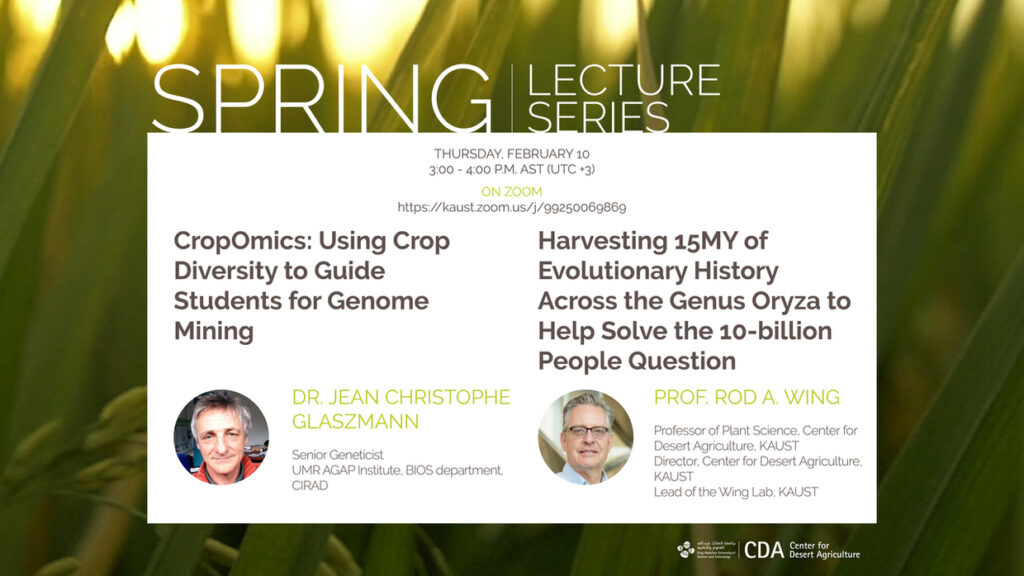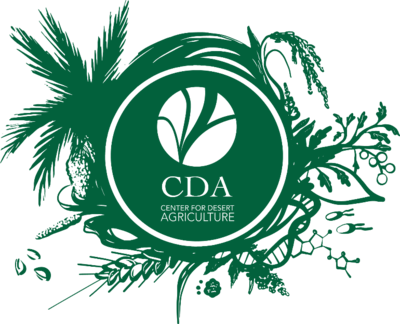
Dr. Jean Christophe Glaszmann and Professor Rod A. Wing will give a joint lecture on the genomics of tropical crops.
Thursday, February 10
3:00 – 4:00 p.m.
On Zoom
Theme: CIRAD-KAUST joint lectures – hosted by Prof. Mark Tester
CropOmics: Using Crop Diversity Dynamics to Guide Students for Genome Mining
By Jean Christophe Glaszmann
Senior Geneticist, UMR AGAP Institut, BIOS department, CIRAD (France)
Abstract
Researchers in crop genetics at CIRAD (Montpellier, France) train students in making use of large genomic germplasm characterization data sets in search for the bases of adaptation. Building on crops with contrasting genomic constitution, we highlight the large range of conditions addressed by the breeders for driving genetic progress. With banana we can reveal genome features that determined the paths to current cultivars. With sugarcane we can unravel a multi-specific aneu-poly-ploid genome which incorporated the base for this outstandingly efficient plant. With rice we can depict traces of past introgression and have the students use them for tagging potentially adaptive gene variation.
About the speaker
Jean Christophe Glaszmann holds a Ph.D. in Genetics (INAPG, 1982). His research focus goes from the assessment of genetic diversity in diverse crops, including new classification of rice varieties and first comparative mapping of the sugarcane genome, to population genomics for mining adaptive genetic diversity in rice germplasm, and international training and capacity building in plant genomics and breeding. He was a member of the Board of Directors (2007-2010) and Director of AGAP (2010-2014) at CIRAD. With CGIAR, he was Visiting Scientist at the International Rice Research Institute (1982-1987), co-Manager of the Generation Challenge program (2004-2010), and Independent Steering Committee member of Roots, Tubers, and Bananas program (2017-2020). Since 2015, Glaszmann has been a member of the Science Advisory Board at IPK Gatersleben.
Harvesting 15MY of Evolutionary History Across the Genus Oryza to Help Solve the 10-billion People Question
By Rod A. Wing
Professor of Plant Science, Center for Desert Agriculture, KAUST (Saudi Arabia)
Director, Center for Desert Agriculture, KAUST
Lead of the Wing Lab, KAUST
Abstract
The genus Oryza contains two domesticates (Asian and African rice) and 25 wild species that span 15 MY of evolutionary history and can be used as a model system to study both basic and applied aspects of natural and artificial evolutionary processes. Our investigation of the genus began in 1997 at the beginning of the International Rice Genome Sequencing Project which evolved into the Intl. Oryza Map Alignment Project (ca. 2003), with the goal of developing an experimental system to understand the genome biology of the genus Oryza. In my talk, I will present the current state of IOMAP with a focus on: 1) the development of a set of high-quality reference sequences that represent each of the Oryza’s 27 species; 2) development of an Inversion Index of Asian rice; 3) neodometication of O. alta and O. coarctata; and 4) a new project entitled “IOMAP: Oryza in the Americas”.
About the Speaker
Rod A. Wing earned his Ph.D. in Genetics from UC Davis, and completed Postdoctoral Research at Cornell’s NSF Plant Science Center and USDA/UC Berkeley’s Plant Gene Expression Center. His 30-year career in plant science has spanned the US, beginning as an Assistant Professor of Soil and Crop Sciences at Texas A&M, Coker Chair of Genetics and Biochemistry at Clemson University, Regents Professor at the University of Arizona’s School of Plant Sciences, and he is now Director of the Center for Desert Agriculture at KAUST. Wing’s work on the genome biology of rice and other crops has empowered the agricultural community across the globe to address both fundamental and applied questions in pursuit of the 10-billion people question i.e. how can we grow enough nutritious food to feed the world by 2050 without destroying our planet?
Visit the Spring Lecture Series webpage to view the full schedule and learn more about the upcoming lectures.
This opportunity is brought to you by the Center for Desert Agriculture.


